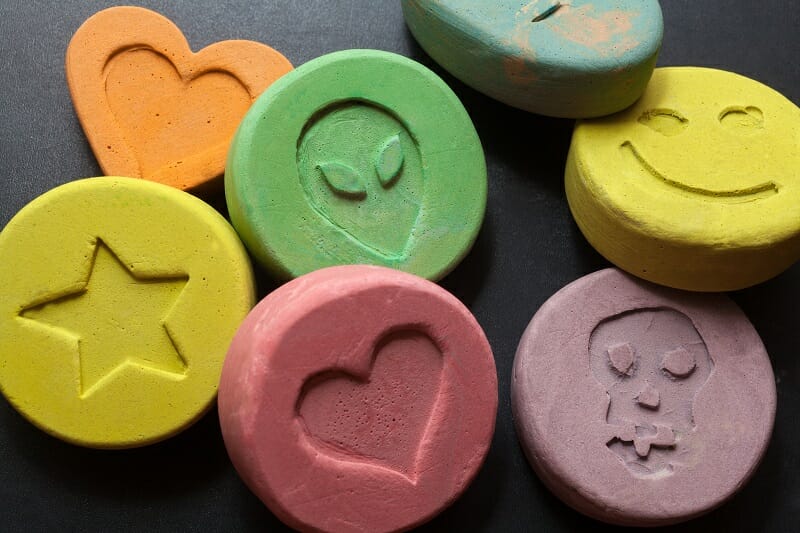Ecstasy Abuse Treatment and Rehab Explained

Ecstasy – more properly known as 3,4-Methylenedioxymethamphetamine, or MDMA – is one of the most popular recreational drugs in the UK, with up to one in twenty young Britons taking the drug regularly. However, its popularity ignores the serious health effects which ecstasy abuse can cause – including death, even on the first instance of consumption – and Britons taking ecstasy frequently enough to become addicted to the drug are exposing themselves to the risk of permanent and debilitating harm. Fortunately there are now numerous organisations providing ecstasy addiction treatment across the country, enabling addicts to beat their habits and return to productive, happy and healthy lives.
Call our admissions line 24 hours a day to get help.
Where to Get Help for Ecstasy Addiction/Substance Abuse
If you have developed an ecstasy addiction, it will be very difficult to overcome it without professional help – and your first step should be to contact your GP, who can assess you and if necessary refer you for treatment. You should also speak with an addiction specialist au fait with the UK’s addiction treatment landscape: the variety of treatment options you will have before you can be somewhat daunting, and a specialist can help you through them and give you the information you need to make the best possible decisions regarding next steps.
Importance of treating ecstasy addiction & when to seek treatment
Ecstasy abuse can have cause very serious harm, and the longer and more frequently you consume the drug the greater the likelihood that such harm will develop. As a result, each day that passes in which you do not reach out for help makes your addiction more dangerous, and the sooner you can get that help the better your prognosis will be.
Once you have reached the point where you recognise you have a problem and decide to take action, contact your GP and/or an addiction specialist to explain your situation and request addiction treatment. There is certainly no wrong time to make that call – but delaying it could prove lethal: if your ecstasy abuse has begun to cause you or anyone else any type of harm, and especially if you have tried and failed to stop taking ecstasy, reach out to your doctor as soon as possible.
Understanding ecstasy addiction treatment and rehab options
The treatment of substance use disorders, including ecstasy addiction, in the UK has become a sophisticated practice in recent years and many thousands of Britons go through treatment successfully every year. There are now a host of treatment organisations and facilities, both public and private, operating across the country; where you go for treatment, who provides it, and the kind of treatment you receive depend on a range of factors including your age, location, condition and financial status: not every clinic will be suitable for you.
However, whether you go down the NHS route, seek private treatment, or even get help from one of the charities active in this area, the important thing is that you do get the help you need. Continuing to abuse ecstasy and to struggle with your addiction could ruin your life, and could even kill you.
- Charities
- NHS Options
- Private Rehab
- Residential Care
Private rehab vs free treatment options for ecstasy addiction
You may wish to begin by investigating free treatment, and a logical place to begin would be the NHS, which as expected provides free ecstasy addiction treatment services across the UK – while various local and national charities may also be able to help you. Unfortunately, places in free treatment services can be very limited and waiting times are often extremely long – which for many addicts can prove intolerable. Getting immediate treatment can often mean going down the private healthcare route – which does of course have a cost attached to it. However, many private clinics now offer credit or easy payment terms; meanwhile, many clients are able to pay for private addiction treatment via health insurance (though by no means all policies cover such treatment).
Executive/luxury rehab programmes for ecstasy addiction
Some high net worth individuals in need of addiction treatment opt to enrol in luxury rehab; such facilities provide treatment in luxurious settings on a par with high-end holiday resorts or hotels, enabling clients to relax in a pleasant and stress-free environment and focus fully upon treatment and rehabilitation. Meanwhile, if you are a senior executive in a high-pressure role, you may not feel able to take yourself away from the office in order to get treatment without jeopardising the performance of your department, or even your career. Some treatment organisations now provide executive rehab clinics where you will be able to get treatment whilst still keeping in touch with work though facilities such as videoconferencing and secure internet.
What Happens in Ecstasy Rehab
Every addict’s experience of rehab is unique: no two clinics are the same, and even within one clinic various approaches to treatment may be provided. Therefore, try to get rid of any preconceptions regarding rehab which you may have before you enter treatment; going in with an open mind will mean you are less likely to encounter any disconcerting surprises during your treatment journey.
Having said that, there are obvious similarities between treatment facilities, and it is possible to give at least a rough guide as to what to expect from ecstasy rehab.
Ecstasy rehab admission process
When an addict reaches out for help with their addiction, they are often in an extremely bad way psychologically (and possibly physically); as a result, providers of addiction treatment endeavour to make their admissions processes as simple and straightforward as they can, to avoid placing even more stress upon those with whom they are speaking. When you first make contact with a treatment organisation, you will need to give them a few basic details regarding your situation, the nature and severity of your addiction, your physical and mental condition and a few other factors; after this consultation the organisation will recommend a clinic for you.
At this point if you are choosing private treatment you will be asked to make a deposit, upon the receipt of which your place in treatment will be confirmed and you will be able to proceed to your clinic of choice (some organisations may provide transport in certain cases).
Ecstasy addiction assessment
When you get to the clinic, your first appointment will be with doctors who will give you a full medical assessment; this assessment is designed to give doctors as complete a picture as possible of your condition and the extent of your addiction, and they will then draw up an addiction treatment plan on the basis of this assessment which will govern your treatment throughout your stay at the clinic (though it will need to be flexible to respond to any changes in your condition or situation which may occur during treatment).
It is crucial that you are entirely candid and cooperative with doctors during this assessment, about your addiction and any other relevant issues (including any cooccurring health disorders you may have). If you are not, your addiction treatment plan will not be as effective as it needs to be – and you may also be endangering your health, as doctors may otherwise prescribe medication which may interact dangerously with other medicines or substances of abuse you have taken and which they are not aware are present in your system.
Acceptance of the problem
No treatment can hope be successful if you are unable to accept that you have a problem; you must truly wish to overcome your addiction if you are genuinely going to dedicate yourself to your treatment. During your assessment, your doctors will be keen to see that you are fully accepting that you have a problem with ecstasy abuse and will do what is required to overcome it; if they are not convinced of this, they may be concerned that you will not react well to the treatment environment and may impact negatively on the treatment of the other clients in the clinic.

It can be difficult for many people to admit that they have an ecstasy addiction – or any other kind of addiction – because they fear appearing weak. This is understandable, but you need to suppress such impulses if you are to engage with your treatment and have the best possible chance of a full recovery.
Medically assisted/controlled detoxification
Once doctors have assessed you and drawn up your treatment plan, you will move through into detoxification (detox), a period of abstinence during which your system will be cleansed of ecstasy and any other substances of abuse you may have consumed. During detox, certain withdrawal symptoms may manifest as you tackle any dependence which may have developed; doctors will be on hand throughout the process to ensure your safety (as some withdrawal symptoms can be extremely dangerous) and may also be able to prescribe certain medications to help reduce the impact of some of the more problematic symptoms of withdrawal. This medically assisted detox may begin immediately after your assessment if doctors believe the prompt administration of medication will give you a head start on battling ecstasy withdrawal syndrome.
Rehabilitation
Following detox, you will move on to the next phase of treatment, sometimes known as rehabilitation (which can be somewhat confusing, as “rehab” is also used to refer to treatment in general, and also to the specific clinic in which you are receiving treatment). Rehabilitation is founded on the principle of “healthy body, healthy mind” and has therapy at its core; therapy aims to reveal the fundamental causes of your addiction and to remediate the challenging thinking and behaviour which has led you to this point, as well as to give you a range of coping mechanisms in order to equip you appropriately for life outside the clinic. As well as therapy you will also be given bespoke dietary and fitness plans in order to improve your general health, and may have access to facilities such as gyms or pools depending on the standard of your clinic.
Recovery
It is vital not to think of addiction treatment as something which is complete the moment you leave a clinic; your recovery is a long-term process requiring very significant effort and dedication if you are to keep up the abstinence you have achieved during treatment. Because of this, good rehabs typically offer up to a year’s free aftercare once you complete your addiction treatment plan in order to give you the most solid foundation possible for your recovery.
Call our admissions line 24 hours a day to get help.
What is an Inpatient Rehab Programme?
Inpatient rehab – frequently known as residential rehab – sees clients staying onsite (usually for between one and three months) in a safe, secure, substance-free and confidential environment in which they can receive treatment whilst benefiting from the 24/7 presence of medical professionals and an array of facilities aimed at supporting and encouraging healing and recovery. Clients in inpatient rehab will also have the support of fellow recovering addicts who understand the nature of addiction and who can provide advice and companionship during difficult times.

What is Outpatient Rehab?
Many people struggling with addiction are desperate for treatment but also feel that they cannot afford the time away from work and family which residential rehab entails.
If you are in this situation you may wish to explore outpatient treatment options; in outpatient rehab you will attend the clinic for appointments including therapy and checkups, and potentially to receive medication, but will be able to carry out any other components of your addiction treatment plan by yourself.
The flexibility provided by outpatient options can be very beneficial but is not without its drawbacks: for starters, in outpatient rehab you will not be fully isolated from ecstasy dealers and other temptations in your daily life, making relapse significantly more likely.
Intensive outpatient programmes
Some facilities provide intensive outpatient programmes, in which clients attend the clinic for four or more sessions (usually of between three and five hours each) each week but are able to carry on their normal lives outside those sessions (this can include going to work if their employers are able to structure work commitments around their treatment obligations). Because intensive outpatient programmes provide plenty of opportunity for addicts to associate with dealers, anyone in such treatment is typically required to undergo frequent drug testing to make sure they are staying compliant with their addiction treatment plans.
Day programmes
If you live close to the clinic, have a strong support network, and/or have significant responsibilities (for example, a young baby) at home, you may prefer to engage in a day programme such as those provided at some clinics in which you would receive treatment at the clinic during the daytime (for anywhere between one and seven days a week) but then return home (or to other accommodation) overnight. Day programmes are also often sought by addicts in recovery who have been through treatment but desire supplementary support.
Ongoing care
Ongoing care – frequently called “aftercare” – is provided by clinics to clients who have gone through treatment in order to support them through the first phases of recovery. Once a client leaves a clinic, they can continue to benefit from therapy, counselling and potentially medication, and an aftercare plan will provide a framework within which such support can be provided by the facility.
Good rehabs usually provide up to a year’s free aftercare, with a schedule of appointments declining in frequency as clients progress through recovery over the course of that year. When doing your research into possible treatment facilities, make sure to enquire about the specifics of any aftercare plans provided, as the standard of aftercare can have a big impact upon your chances of permanent recovery.
Call our admissions line 24 hours a day to get help.

How is Medication Used to Treat Addiction?
It is important to remember that there is currently no pharmaceutical cure for addiction (although a large amount of research in this area is ongoing); nevertheless, medication is used in various different ways in the treatment of addiction in the UK. For example, it may be provided to reduce the intensity or frequency of cravings; to disincentivise substance abuse; as an alternative to more dangerous, potentially illegal drugs; or to lessen the impact of symptoms of withdrawal. Medication of various kinds may also be provided on an emergency basis if a client’s heath is deemed to be in danger.
Medications used in addiction treatment & rehab
In rehab, the most common use for medication is to alleviate withdrawal symptoms. However, not everyone in addiction treatment will require medication, and indeed in some cases it may actively be dangerous to prescribe it (for example, if it would interact dangerously with other medications or substances of abuse which a client has taken). Moreover, not every medication is relevant in every case of addiction.
If you are not prescribed any medication, do not conclude that this is an indication that your situation is not a serious one, nor that your treatment is any less likely to be successful in defeating your ecstasy addiction. Most importantly, never attempt to self-medicate any aspect of your addiction: only ever take medicine prescribed to you by a doctor and in strict accordance with the doctor’s instructions.
- Naltrexone (Vivitrol)
- Buprenorphine (Buprenex)
- Methadone
- Disulfiram (Antabuse)
- Acamprosate (Campral)
- Paroxetine (Paxil)
- Modafinil (Provigil)
- Desipramine (Norpramin)
- Mirtazapine (Remeron)
- Bupropion (Buproban)
- Gabapentin (Fanatrex)
- Vigabatrin (Sabril)
- Baclofen (Kemstro)
- Topiramate (Topamax)
Psychotherapy for Ecstasy Addiction Treatment
All addiction treatment is founded upon therapy, and the treatment of ecstasy addiction is no different. Addiction is basically a disorder of the mind, and while detox and medically assisted withdrawal can address some of the physical consequences of addiction, the mind must be treated with therapy aimed at revealing and addressing the psychological factors which have led to substance abuse and addiction.
Various approaches to therapy may be employed in addiction treatment (some of which must be provided alongside the prescription of certain medications) and it is important to remember that not every therapeutic model is equally beneficial to every client.
Social skills/interpersonal/growth psychotherapy
There is a strong connection between substance abuse and addiction and poor social and interpersonal skills; people who have such inadequate skills can find it very hard to build important life relationships such as romantic or professional ones, which can in turn have very serious psychological and emotional implications. Such people frequently turn to substance abuse as a coping mechanism, which can result in addiction and subsequently in a further deterioration of interpersonal skills and circumstances as they withdraw from family and friends.
Interpersonal psychotherapists work to improve their clients’ interpersonal skills in order that they can become better at developing and sustaining significant relationships, which can boost happiness and wellbeing as well as improving their professional and financial circumstances and prospects. Such advances can also have benefits for ongoing therapy as clients become better able to articulate their thoughts and emotions.
Coping-focused psychotherapy
Coping-focused psychotherapy methodologies such as cognitive behavioural therapy (CBT) and dialectical behavioural therapy (DBT) are amongst the most popular forms of therapy provided during addiction treatment. “Coping” is defined in psychology as making a conscious effort to resolve certain personal and interpersonal problems, with the aim of reducing, defeating or bringing to a tolerable level conflict and stress; while coping mechanisms are usually developed as an individual matures, some people adopt negative coping strategies including substance abuse which can be extremely damaging.
Coping-focused psychotherapists work with clients to investigate the flaw in their existing coping strategies and to build better and healthier mechanisms with which to address the conflict and stress they encounter in their daily lives, as well as to develop more positive ways of viewing the world which will benefit them once they leave the clinic.
Types of psychotherapy used in ecstasy addiction treatment
Numerous therapeutic models have been developed for use in the treatment of addiction, including ecstasy addiction, and it is impossible for any one clinic to provide access to every one of these models. If you have a preference for a particular methodology (for example if you have benefited from therapy in the past) you may wish to attend a clinic which offers this model; speak with an addiction specialist about which clinics offer specific types of therapy during treatment.
Not every addict benefits equally from, or responds positively to, every therapy model and you may wish to try out different methodologies before settling on an approach which is right for you. Bear in mind, though, that not every clinic allows for such experimentation; when doing your research into treatment facilities, ask staff how much leeway you will have to trial different therapy models.
Exploratory psychotherapy
Exploratory, or psychodynamic, psychotherapy investigates the connections between past experiences and present behaviour. Traumatic experiences are a significant factor in the development of addiction and exploratory therapists work with their clients to explore any such experiences and how they have impacted the client psychologically and emotionally, with the aim of coming to better terms with those experiences.
Exploratory psychotherapy can be rather arduous and even distressing for clients as they relive very difficult experiences, and therapists need to work carefully to avoid causing further harm, which can make the process a protracted one. However, the benefits are manifold, and clients who have been through addiction treatment often choose to remain in therapy long after their last episodes of substance abuse in order to continue to receive those benefits long into the recovery process.
- Acceptance and commitment therapy
- Art therapy
- Cognitive behavioural therapy
- Counselling
- Dialectical behavioural therapy
- Experiential therapy
- Family therapy
- Fitness therapy
- Group therapy
- Holistic therapy
- Meditation
- Music therapy
- Psychodynamic therapy
- Individual therapy
The Recovery Process
Once you have gone through an addiction treatment programme and have achieved abstinence, it is understandable that you may feel much more positive about your life and even that you have now left your ecstasy addiction behind you for good.
However this can be a dangerous mindset as it can encourage you to slip into complacency. You should look at recovery as being a much longer-term process than your treatment programme – indeed, some people prefer to think of themselves as “addicts” even though it may be many years since they last engaged in substance abuse – and one with its own challenges and pitfalls associated with it.
Elements of recovery
When thinking about the recovery process it can be helpful to break it down into a number of different components, each of which you can address independently during treatment (indeed, some forms of therapy are especially useful when it comes to addressing certain elements of recovery). Bear in mind that everyone has different abilities and moves through the different elements of recovery at different speeds, so do not become too focused upon how your peers are performing during treatment – nor too despondent if you feel that you are struggling with certain aspects of the treatment programme: this simply gives you guidance on where you need to concentrate your efforts and where you will need to be especially vigilant once you leave the clinic.
- Developing hope
- Secure base
- Sense of self
- Supportive relationships
- Empowerment
- Social inclusion
- Coping skills
- Giving meaning
Call our admissions line 24 hours a day to get help.
How Long are Ecstasy Rehab Programmes?
A stay in residential rehab for the treatment of ecstasy addiction will typically last between 30 and 90 days; some clinics may provide shorter and more intensive programmes, while others may offer longer-term treatment. Outpatient rehab is usually a significantly longer-term process, lasting several months or even a year or more depending on the programme.
However, while you may have a certain timeframe in mind when you first get into treatment, there are many factors (including your physical and mental condition, the severity and duration of your addiction, and the treatment programme in which you are enrolling) which will determine the length of time for which you will need to stay in rehab. Moreover, even if you start off intending to stay in treatment for a given time, this may need to evolve while you are being treated: you may respond better than expected to treatment and therefore be able to move through your ecstasy addiction treatment plan more quickly than planned; on the other hand, you may encounter unexpected difficulties which will lead doctors to suggest you stay in rehab for longer than initially projected.

What does Ecstasy Rehab Cost in the UK?
In very broad terms, private ecstasy rehab in the UK will cost between £4,000 and £15,000 per month:
costs will be affected by various factors including the type of treatment you receive, the standard of the clinic, and any specialist care you require. However, because of the significant range of costs it is very important that you get precise pricing from any clinic you are interested in attending before committing to a treatment programme; it can be useful to speak with an addiction specialist who can discuss pricing with you and may be able to recommend more affordable treatment options.
Ecstasy Addiction Recovery and Aftercare
Most quality treatment facilities will provide up to a year’s free aftercare for clients who successfully complete a treatment programme. While some people find it difficult to return to a clinic once they have been through treatment (as they do not wish to be reminded of their recent travails) you should take full advantage of any aftercare with which you are provided, as the more support you can get during your recovery the greater the likelihood that that recovery will be successful. Remember that your recovery is a long-term endeavour and while you may feel confident in the immediate aftermath of your treatment you will encounter a great many challenges back in the outside world which can threaten to derail your recovery.
Recovery and community
Support networks are crucial during the recovery period. Most people think of loved ones and friends when contemplating support structures; however, one prominent silver lining to the ongoing addiction epidemic in the UK is that there are now thousands of recovering addicts throughout the country who together constitute a very important support community which can help you as you move through recovery. Moreover, you may find significant benefits (including help with working through outstanding issues of your own) in helping other members of that community, giving them advice and friendship and the lessons you can impart following your journey through treatment.
Support groups
Various support group organisations – including Narcotics Anonymous (NA) – work across the UK to help recovering ecstasy addicts; support group meetings (usually held weekly) give you access to an understanding peer group who can give you invaluable advice and support, and attendance at meetings is usually free for anyone committed to ongoing abstinence. Speak with an addiction specialist to find out more about support groups active in your area.
12-Step
The 12-step methodology first developed by the founders of Alcoholics Anonymous (AA) is used by many support group organisations and fellowships, including NA, and has been responsible for saving millions of lives around the world. While not everyone feels able to engage with the 12-step model (in part because certain steps may be incompatible with some personal beliefs) you may well be able to benefit greatly from it; speak with an addiction specialist to find out more.
Ready to Start Rehab?
If left unaddressed, your ecstasy addiction could kill you, and even if you survive it it could permanently impair your health and your life circumstances and prospects. The sooner you can overcome it, the better the prognosis will be – and this usually means reaching out for professional help. As soon as you are able to admit that you have a problem with ecstasy abuse and dedicate yourself to treatment, you will be ready to enter rehab and start receiving that help.
Take control of your life – get started on the road to recovery
It is easy to feel that you have lost control of your life to ecstasy addiction – but it is vital to remember that with the right help you can take back that control and turn your life around. No matter how serious your addiction, you can conquer it – so pick up the phone today to your doctor and/or and addiction specialist and find out about the treatment that could get you back on the path to success and happiness. Don’t delay: set out on the road to recovery today.
Sources
- https://en.wikipedia.org/wiki/MDMA
- https://www.oasisrehab.co.uk/rehab-programme/
- https://www.oasisrehab.co.uk/admissions-process/
- https://www.addictionhelper.com/treatment-rehab/day-care/
- https://www.ukat.co.uk/outpatient-treatment-services/
- https://en.wikipedia.org/wiki/Intensive_outpatient_program
- https://en.wikipedia.org/wiki/Coping_(psychology)
- https://www.narconon.org/drug-rehab/skills/interpersonal-development.html
- https://www.columbiadoctors.org/treatment/exploratory-psychodynamic-psychotherapy
- https://ukna.org/page/12-steps
Call our admissions line 24 hours a day to get help.
No matter where you live, there is a drug rehab center that can help you overcome your addiction. We'll help you find it.
Select a County



